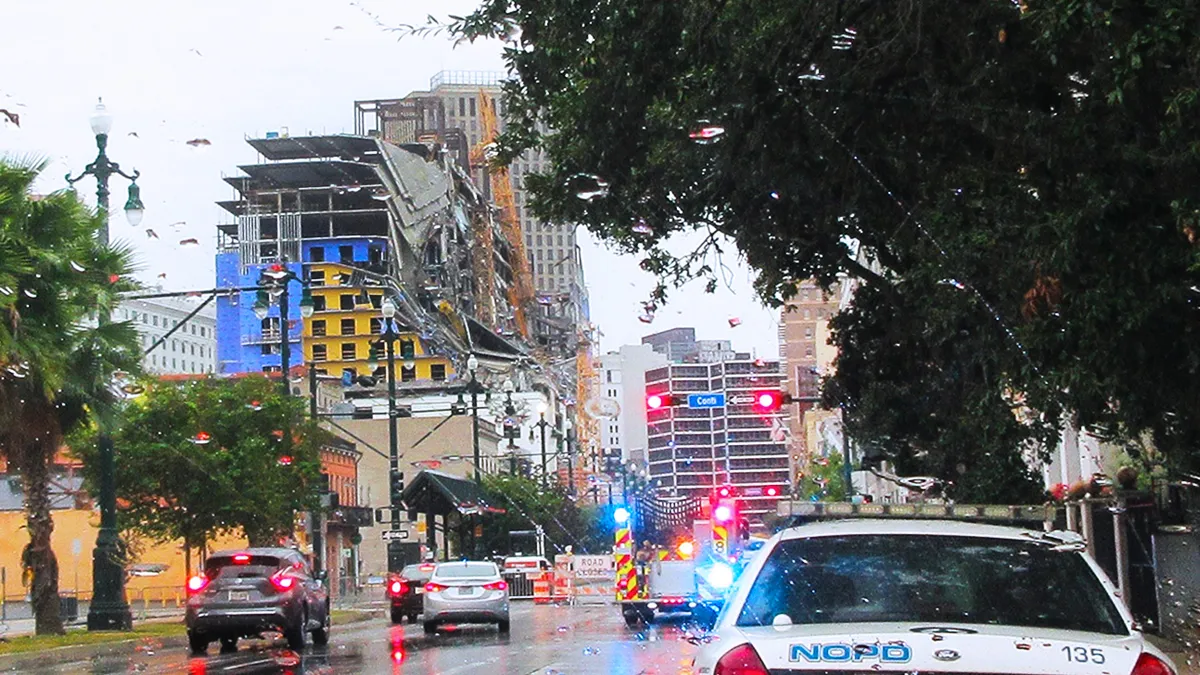Dive Brief:
- A grand jury elected last week not to charge anyone with a crime stemming from the 2019 Hard Rock Hotel construction collapse in New Orleans, which killed three people and injured 30 others.
- A statement from Orleans Parish District Attorney Jason Williams obtained by CNN indicated the grand jury did not see enough evidence to build a criminal case. Williams’ investigation into the collapse began in 2021 when he took office, which gave him two years to file criminal charges. The grand jury examined the case but decided not to charge anyone before the deadline.
- A lack of cooperation from OSHA hamstrung the case, according to the DA’s statement. Although the agency investigated the collapse, it “hindered our progress by withholding a crucial report for our review,” the statement read, adding the “refusal to disclose all evidence and reports at their disposal severely hampered our presentation.”
Dive Insight:
An OSHA spokesperson told Construction Dive on Oct. 5 that the agency “is aware of the [criminal] case with the DA’s office and the pending deadline,” adding “they’re trying to get things wrapped up” and reach a settlement imminently. Following the grand jury’s decision, OSHA could not be reached for comment.
The hotel project at 1031 Canal Street in the city’s central business district partially collapsed on Oct. 12, 2019, as it was under construction. The bodies of the slain workers — Jose Ponce Arreola, Anthony Magrette and Quinnyon Wimberly — remained in the wreckage for months.
Later, footage showed former workers expressing concern about support beams, and a flurry of civil lawsuits followed, alleging the project used poor design, improper building practices and unskilled workers.
Federal OSHA’s initial investigation concluded in April 2020, when the agency announced citations for engineer Heaslip Engineering, general contractor Citadel Builders, Suncoast Projects (doing business as Hub Steel) and eight subcontractors as a result of the collapse.
Collectively, builders faced $315,536 in penalties:
- Citadel Builders faced three serious violations for inadequate egress from the building. Initial fines totaled $28,338, but the general contractor settled for $21,254. Other subcontractors also failed to provide emergency egress and fall hazard training, the agency found. Citadel could not be reached for comment.
- Steel provider Suncoast Projects failed to maintain structural stability of the building, according to OSHA. The initial fines hit $37,191, but Suncoast is contesting the citation. Construction Dive attempted to contact Suncoast through a publicly available email for Hub Steel, but did not hear back by time of publication.
- The agency determined Heaslip Engineering “failed to adequately design, review or approve steel bolt connections affecting the structural integrity of the building,” resulting in one willful violation with an initial fine costing $154,214. The company also contested the fines. Construction Dive attempted to contact Heaslip via a publicly available email, but did not hear back by time of publication.
Contested fines can lead to long settlement talks. The agency still hasn’t announced a settlement in its case with Heaslip or Suncoast, and OSHA doesn’t share information from open cases, the spokesperson told Construction Dive Oct. 5.
Legal order of things
These cases tend to follow an order of operations, and criminal penalties usually come first, said Carol Sigmond, partner at law firm Greenspoon Marder in New York City.
“The reason is that the administrative agencies do not want to create potential due process issues as to the right against self-incrimination,” Sigmond said. “OSHA could have proceeded but I believe general good government policy nationally is to hold administrative proceedings in abeyance until the criminal proceedings are concluded.”
Sigmond added the local statutes may not be “on point,” as criminal charges must tie to a specific law, and if the language or application is too narrow or the intent standard too high, that could mean criminal charges are harder to prove.
Nonetheless, she emphasized contractors shouldn’t want to engage with OSHA to settle a case like the Hard Rock until criminal charges were closed, as prosecutors could use admission of guilt in a civil enforcement case against them.
By the same token, OSHA may elect to keep the investigation open for as long as possible, said Trent Cotney, partner and construction team leader at Tampa, Florida-based law firm Adams and Reese.
The longer a case stays open, Cotney said, the more time there is for new evidence to come to light or for the subject to commit another violation, adding to the citations issued.














